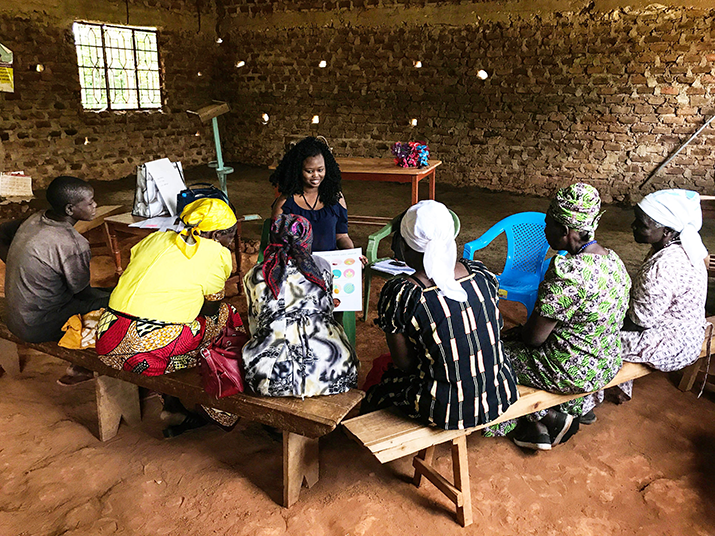Lea Mimba Pregnancy Clubs: Findings from an Evaluation of the Group ANC Model
Lea Mimba Pregnancy Clubs: Findings from an Evaluation of the Group ANC Model
By: Shafia Rashid and Kate Ramsey

Judy Moraa is one of many women who participated in the Lea Mimba Pregnancy Clubs at one of six health facilities in Kakamega County in western Kenya. Lea Mimba, which means “take care of your pregnancy” in Swahili, is a forum where the same health provider and pregnant women come together over the course of a pregnancy, allowing Judy and others to learn essential information, practice self-care, and provide each other with emotional and social support to cope with the stresses of pregnancy.
Beginning in 2017, Management Sciences for Health (MSH) worked in close partnership with the national ministry of health, the county health management team, the national nurses association (the Kenya Progressive Nurses Association or KPNA), and M4ID, a social impact design company specializing in development and health, to test the effects and acceptability of the Lea Mimba Pregnancy Clubs. This innovative group model for antenatal care (ANC) is more responsive to women’s needs for social support without overburdening health providers. Over the course of 10 months, more than 1,600 women were enrolled in 177 Lea Mimba clubs across the six project sites.
Using mixed qualitative and quantitative methods, we assessed the effects of the group ANC model on:
ANC retention
- Knowledge of healthy behaviors during pregnancy
- Number of birth preparations made (including saving money, arranging for transport, and preparing items for the baby)
Overall satisfaction with ANC services
Women’s empowerment
Information was collected through a survey, focus groups and interviews with women and other stakeholders including county health officials, health providers, facility managers, and community health volunteers, to understand the model’s acceptability and its effects on the quality of antenatal care. Through observations and time diaries we assessed the operational requirements for introducing and sustaining the pregnancy clubs, including workflow and context mapping.
Overall, the findings were mixed, with positive effects in some areas and no statistically significant effects in others:
- We found an improvement in the proportion of women who completed four or more ANC visits in the six project sites: overall, 69.6% of women in the sample attended four or more ANC visits, which included 3 or more group ANC visits and their first individual ANC visit in which they were assigned to a Lea Mimba session. This is an improvement from the baseline value of 50% from the national health management information system (HMIS) and for Western Kenya at 51.3% (Kenya Demographic Health Survey 2014). However, these figures should be interpreted with caution as they were measured differently.
- Satisfaction with ANC services among survey respondents almost doubled from baseline to endline in all respondents, and this effect was even greater in respondents under age 25.
- Survey respondents were almost twice as likely to have made two birth preparations at endline compared to baseline, an improvement from 33.0% to 48.9%.
- However, we found no difference in women’s knowledge of ways to improve or maintain health between baseline and endline, and no evidence in a change in empowerment between baseline and endline, using a measure developed for Malawi and Tanzania.
- Time diaries indicated that women attending the pregnancy clubs spent substantially more time at the health facility compared to those receiving traditional ANC. Not only due to the increased time spent in counseling, but also due to time spent waiting for club sessions to begin.
- At the request of the national ministry of health, we tested the feasibility of an 8-visit model recommended by WHO in its 2016 guidelines; we found that the mean number of ANC visits across all facilities was 4.92 visits.
Qualitative data shows that the pregnancy clubs were acceptable to women, health care providers, and other stakeholders. All respondents appreciated the facilitated learning style, which provided practical knowledge and promoted mutual learning between women and health providers around, for example, community beliefs on pregnancy and childbirth.
Women also discussed the social support they received from other women and from the health provider, how it enabled problem-solving and coping skills and created a safe space for discussion and sharing. However, implementation challenges, including long waiting and staffing shortage, made it less acceptable for some.
The implementation period was likely too short to see the full effects of the model at the facility and population level. Additional research can help us better understand the intermediate pathways leading to observed changes in utilization and practice of healthy behaviors. For example, while women described changes in learning and empowerment during qualitative interviews, those results were not replicated in the quantitative measurements, indicating a need to more accurately measure changes in beliefs and behavior related to self-efficacy and social support.
Learn more about the findings and lessons learned from the project’s implementation:
Pregnancy Clubs reflects an important change in how ANC services are delivered and organized and how health providers and women interact with each other. While this approach holds promise for better meeting the social support and informational needs of pregnant women and for improving the quality and coverage of ANC, further efforts to address the logistical and operational elements are needed to ensure that challenges are addressed and that group ANC can be scaled and sustained.